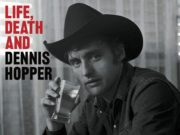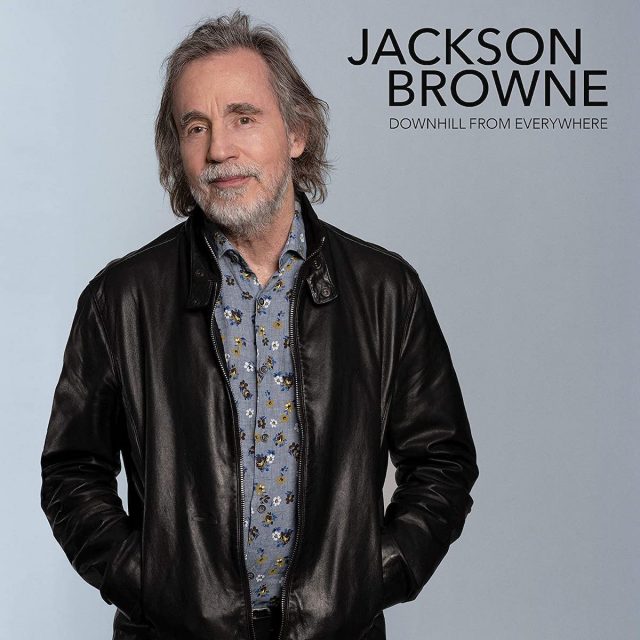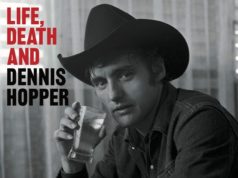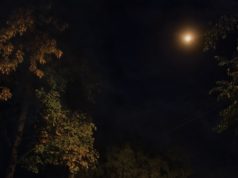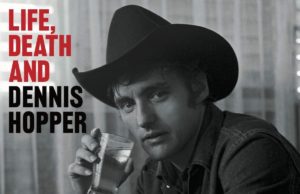Running on empty? Not by a long shot.
On his 15th studio album in nearly 50 years, singer-songwriter Jackson Browne continues to be one of the most dependable and durable tunesmiths of his generation. Downhill From Everywhere delivers exactly what you expect and want from Browne: Another collection of warm, mellow and meticulously crafted California country-rock and Laurel Canyon folk that balances political activism and personal reflection. Granted, he isn’t breaking much new musical ground or taking many creative risks on these 10 tracks. But even if he’s happy to coast along comfortably in his own lane, the 72-year-old troubadour makes it clear he’s still got both hands on the wheel and plenty of gas in the tank. Long may he cruise — even if it may be ever-so-slightly downhill. After all, he’s earned it.
THE EDITED PRESS RELEASE: “Songwriting is a mysterious thing,” says Jackson Browne. “Sometimes it feels a bit like consulting the oracle.”
Take a listen to Downhill From Everywhere, Browne’s first new album in six years, and you might begin to suspect that he’s speaking quite literally. Though the songs here were recorded prior to the tumultuous events of the past year, the collection feels remarkably prescient, grappling with truth and justice, respect and dignity, doubt and longing, all while maintaining a defiant sense of optimism that seems tailor-made for these turbulent times. Like much of Browne’s illustrious catalog, Downhill From Everywhere is fueled by a search — for connection, for purpose, for self — but there’s a heightened sense of urgency written between the lines, a recognition of the sand slipping through the hourglass that elevates the stakes at every turn. “Time rolling away, time like a river, time like a train,” he sings. “Time like a fuse burning shorter every day.”
While such ruminations might suggest a meditation on aging and mortality from a rock icon in his early 70s, the truth is that Browne isn’t looking in the mirror; he’s singing about us, about a world fast approaching a social, political, and environmental point of no return. Clean air, fresh water, racial equity, democracy — it’s all on the line, and nothing is assured. “I see the writing on the wall,” says Browne. “I know there’s only so much time left in my life. But I now have an amazing, beautiful grandson, and I feel more acutely than ever the responsibility to leave him a world that’s inhabitable.”
Though the issues Browne tackles on the album are often sweeping and existential, he writes on a far more intimate scale, consistently zeroing in on the human experience at the heart of it all. Whether singing about a Catholic priest navigating the slums of Haiti on his motorbike or a young Mexican woman who’s risked everything in pursuit of a better life across the border, Browne manages to tap into a universal emotional language, one that makes the old feel new and the foreign feel familiar. “There’s a deep current of inclusion running through this record,” Browne explains. “I think that idea of inclusion, of opening yourself up to people who are different than you, that’s the fundamental basis for any kind of understanding in this world.”
Indeed, that kind of profound empathy has been at the core of Browne’s work for more than 50 years now. Hailed as one the greatest songwriters of all time, Browne got his start behind the scenes, penning tunes that would be recorded by the likes of Nico, The Byrds and Tom Rush before launching his own solo career with his classic 1972 self-titled debut. Known for era-defining hits like Running On Empty and The Pretender, as well as deeply personal ballads like These Days and In the Shape Of A Heart, Browne would go on to sell more than 18 million records in the US alone and be inducted into both the Rock and Roll and Songwriters Hall of Fame. Throughout his career, Browne also regularly threaded activism into his life and songs, raising funds and awareness for social, political, and environmental efforts.
And yet at no point on the album do we hear preaching from Browne, no lecturing or moralizing or pitting of neighbour against neighbour. Instead, the calls to action here are implicit, as are the warnings about the consequences of continued apathy. Browne relies on us to draw our own conclusions from the music, to connect the dots in the juxtaposition of imagery and recognize ourselves in the richly detailed renderings of modern life. “As a songwriter, you want to catch people when they’re dreaming,” he explains. “You want to find a way into their psyche when they don’t see you coming.”
With Downhill From Everywhere, Browne doesn’t just catch us while we’re dreaming, he challenges us to dream bigger. The songs are ultimately portraits — of people, of places, of possibilities — that appeal to our fundamental humanity, to the joy and pain and love and sadness and hope and desire that bind us all, not only to each other, but to those who came before and the generations still to come.”


